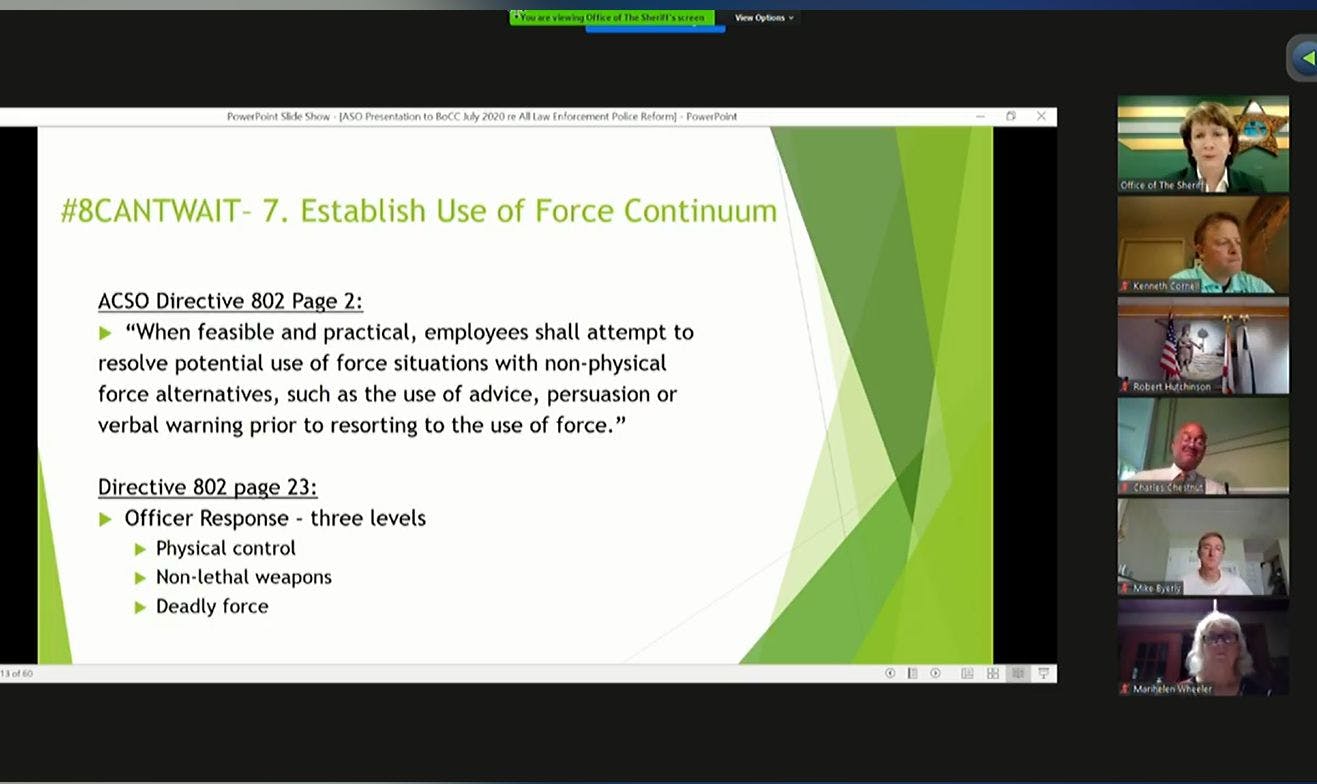
Sheriff Sadie Darnell tells the county about how the Alachua County Sheriff's office already complies with the police reform recommendations made by the 8 Can’t Wait campaign.
The Alachua County Commission discussed past and current police reform with Alachua County Sheriff Sadie Darnell Friday.
Darnell began her presentation by discussing the 8 Can’t Wait campaign, which comprises eight policy changes recommended by Campaign Zero, for effective police reform. She said the Alachua County Sheriff’s Office already complies with all eight policies in its directive, the office’s code of conduct.
Some acts of force, such as choke holds and shooting from moving vehicles are banned by the ACSO, Darnell said. Officers must also deescalate and warn suspects before shooting.
ACSO is reworking the directive to obligate officers to intervene when they see another officer misusing force, Darnell said. The change is inspired by the murder of George Floyd, who died after officers failed to intervene when now-firedofficer Derek Chauvin stood on Floyd’s neck for more than eight minutes.
The directive currently only requires officers to report situations where other officers misuse force, Darnell said.
The Criminal Justice Standards and Training Commission, which has 19 members who are appointed by the governor for a four year term, is under the Florida Dept. of Law Enforcement. The CJSTC oversees all Florida law enforcement agencies, including ACSO, Darnell said.
The commission can revoke officers’ certification. It also requires all officers in the state get 40 hours of training every four years, Darnell said. About 70 percent of ASCO officers are trained in crisis intervention, which teaches law enforcement how to respond to mental health crises, according to Darnell
Darnell said she is pushing to require that every deputy receives crisis intervention training.
After Darnell’s presentation, County Commissioner Mike Byerly asked her about some residents’ calls to defund the police. Darnell said she doesn’t believe police funding decreases community resources because she said sheriff deputies already carry out some of the traditional duties of social workers, mental health professionals, and child protective services.
Darnell also said the community needs law enforcement to respond to mental health or substance abuse emergencies.
“Who is going to respond effectively?” Darnell said. “That is going to be law enforcement because we are out there.”
County Commissioner Charles Chesnut asked Darnell to explain ACSO’s use of force policy. Darnell said deadly force can only be used as a last resort when an officer’s life or resident’s life is threatened.
“If you walk away, that’s passive resistance,” Darnell said. “If you start charging at me, that’s physical resistance. If you start charging me with a knife or gun, that’s deadly force.”
Chestnut also asked Darnell about resident’s concerns about militarizing police. She said armored vehicles are an important tool to save lives during active shooter situations.
“The truth is, we are paramilitary,” Darnell said. “We are paramilitary because we, at times, have to use deadly force.”
After commissioner questions, the commission opened the floor to public comment.
ACSO isn’t equipped to deal with mental health crises, said Danielle Chanzes, a local activist. Chanzes said ACSO funding should be diverted to community mental health resources.
Chanzes also mentioned the COVID-19 outbreak in Alachua County Jail, where Chanzes’ boyfriend is currently imprisoned. Chanzes said the first infected person at the jail was arrested for driving with a suspended license, and the inmate that was held in isolation for eight days before being moved into the general population.
To Chanzes, police should limit arrests to decrease the number of people in the jail, which would protect them from the outbreak.
Several callers said they were concerned with Darnell’s comment likening ACSO to a paramilitary force. One caller, who identified themself as a combat veteran who served in Iraq and Afghanistan, said militarizing police keeps community resources, such as mental health services, from receiving proper funding.
“I find it horrifying,” he said. “Policing cannot be a solution to addressing the root causes of all of these issues.”
Another caller voiced concerns about police training. The caller recommended officers go through a two-to-four-year training program.
“You can't expect a person to have a few months of training and expect them to be a police officer with a gun, a lawyer and a mental health person,” the caller said.
While most callers were critical of ACSO, some were supportive.
“We need to stick to our guns, to use a pun,” a caller said, adding that police funding should be increased.
Another caller, who identified themselves as a former police officer, said police need to be armed because citizens are also arming themselves.
“They are arming themselves with these high-powered rifles,” he said. “You can't very well expect these officers to respond with just a Nerf gun.”
After the public comment period, Darnell responded to some of the criticism. She said the jail population decreased from 1,000 inmates in 2006 to 640 people today. She also said the jail is taking the outbreak seriously. She said the jail environment is as sterile as possible given the jail’s structural setup.
In her response to concerns about her paramilitary comment, she said her use of paramilitary refers more to ACSO’s rank structure, which originates from the military in origin, not its guns and equipment.
“It's much less about the appearance and much more about the process,” she said.
In response to defunding the police, Darnell said the community’s perceptions of local law enforcement was impacted by police misconduct in other cities and counties. She also said the public hasn’t recognized the changes ACSO has made.
Darnell said ACSO believes garnering support is difficult now because of COVID-19 and the growing distrust of law enforcement.
“I think also what has been clear in this conversation is that law enforcement is a very complicated and difficult profession,” she said. “We need support and not so much criticism.”





